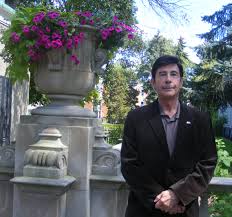Last September, Gordon McIvor gave a presentation in English and French at the Glendon Alumni Family Day in which he described the truly astonishing journey – his own – of an English Canadian turned Francophile, despite the fact that nothing in his environment predisposed him to this direction. For those few people who do not know him, McIvor, a 1976 Glendon graduate, has received several awards and honors for his work in communications, including the ACE Award of the Canadian Public Relations Society (CPRS). He is President of the Alliance Française de Toronto and a member of the CPRS College of Fellows. McIvor also chairs the Communications and Public Relations Foundation and the Speakers Committee at the Empire Club of Canada.
McIvor described his childhood to the Glendon alumni audience as “pre-French immersion.” The arrival of Radio-
Canada’s French-language radio and television services in Calgary stimulated his interest and, while still quite young, he began listening to radio and television in French. When his father changed careers and moved the family to Toronto, McIvor pursued and developed his interest in the French language and culture. He joined the France-Canada Association and was the winner of two consecutive summer
scholarships established to allow English Canadians to spend time in France – which he did.
He gradually realized, however, that, while this path helped him develop a love for France and its culture, it kept him
almost totally in the dark as far as Quebec was concerned. “Moreover, this was the path taken by a lot of people like
me in English Canada,” he added.
At age 18, McIvor decided to pursue his university studies at Glendon College, a choice prompted by Glendon’s magnificent campus and relatively small student body. There he discovered French Canadian culture and Quebec
literature and became involved in the College’s theatrical activities. His French was good enough for him to play the role of Valère, the young romantic lead, in Molière’s L’Avare (The Miser).

Gordon McIvor at Glendon
A Pauline Julien show at Glendon was a real eye-opener for McIvor. Not only did he discover superb singing in the
French language of Quebec, but he also understood the message that was being conveyed in this language. Thanks
to this event, he went on to listen to recordings by Quebec songwriters and developed increased respect for
Quebec and the vitality of its culture. “That was when the two solitudes came to an end for me,” he stated.
While still a student, McIvor seized the opportunity to complete the third year of his undergraduate degree in
Montpellier, where he spent the academic year in a regular classroom alongside French students and earned a
DEUG (Diploma of General University Studies). Back at Glendon, McIvor completed his bachelor’s degree in 1976.
Clearly, in love with France and French culture, he decided to return to Montpellier to do a master’s and a doctorate.
After completing his graduate work, he met Canadian diplomat Ken Taylor, an encounter that would later lead to his
working for the Government of Canada. He then moved on to Lavalin in Montreal, where he worked in corporate
communications.
McIvor’s bilingualism and biculturalism were already valuable assets in his work, enabling him to ensure consistency
in the English and French messages coming from the organization and, he said, “to reduce the silos in the work
environment” between staff in both languages. He added that bilingualism is important because it pushes doors
wide open. Over the years, McIvor realized that not only had he become a Francophone but also a Francophile.
According to Wikipedia, “A Francophile … is an individual who has a strong positive predisposition or interest toward
the government, culture, history, or people of France.”
As a result of his strong love for the language and culture of France (and Quebec), McIvor decided to express himself
publicly on various topics by writing opinion pieces for the Toronto Star and Le Devoir. His reputation as a Francophile
began to spread. After his time at Lavalin, he returned to Toronto, taking on a position in communications at
Scotiabank. True to himself, he chaired the French for the Future program, an opportunity that allowed him to work
extensively with the French teachers. He then joined the Board of Directors of the Alliance Française de Toronto and is
now President of that organization. 1
BILINGUALISM
Inspired by his passion for things French, McIvor has developed a highly personal perspective on the value of
bilingualism. In particular, he does not view bilingualism as a painful duty to which people must submit for strictly
work-related purposes. “You can take advantage of bilingualism and promote it,” he adds. Moreover, he likes to quote
John Ralston Saul, who compares bilingualism to a corridor in which there is an open door: why close this open door
that is inviting you to see what is on the other side? In addition, as one of the country’s founding languages, French
enjoys a privileged place in Canada – a fact that is even enshrined in our Constitution.
He also insists that learning a language is useful not only for professional reasons but also – and especially – for
personal satisfaction. According to some recent research, there are even medical benefits: bilingual individuals are
apparently less susceptible to Alzheimer’s Disease.
McIvor does not bury his head in the sand when it comes to the politics of language in Canada and Quebec. He feels
that being Francophone does not necessarily mean agreeing with the policies of the Government of Quebec. “They’re
not the same thing,” he said. He disagrees with the Charter of Values that the PQ government is promoting: “This
project is perceived in Canada as a document that fails to respect the reality of our country,” he stated. As far as he is
concerned, the charter does not offer a way for French-speaking communities to live; rather, it opens the door to life in
a closed and isolated society.
McIvor’s career has given him opportunities to spend time in India. He feels he has become as much an
“Indophile” as he is a Francophile because, as he said, “If you want to have any understanding whatsoever of India,
you need to understand the differences in that country’s values and languages. You must always put yourself into the
context of people’s lives.” He is of the view that, when we master another language and understand another culture,
we experience a profound change in our vision and perception of others – a change for the better.
McIvor has had a rich and fruitful journey which, he says, actually began with Glendon College. Over the years, he has
come to realize that all people have essentially the same desires and aspirations.
His evolution as a Francophile is no longer an unusual case in English Canada – a fact which he is only too glad to
point out. More than three million English Canadians are now bilingual, and French immersion schools from
Vancouver to St. John’s, Newfoundland, have such long waiting lists that they have to turn some students away every
year.
He concluded on a happy note, declaring that Francophilia is alive in well in Canada.
By Michel Héroux
1 McIvor completed his term at the Alliance française after this article was written.


